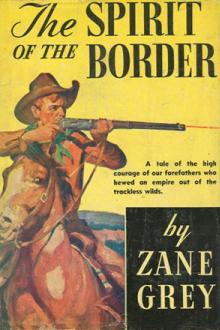The U. P. Trail, Zane Grey [robert munsch read aloud .txt] 📗

- Author: Zane Grey
Book online «The U. P. Trail, Zane Grey [robert munsch read aloud .txt] 📗». Author Zane Grey
He shot her. She swayed backward, uttering a low and horrible cry, and even as she swayed her face blanched and her eyes changed. She fell heavily, with her golden hair loosening and her bare white arms spreading wide. Then in the horror-stricken silence she lay there, still conscious, but with an awful hunted realization in the eyes fixed upon the cowboy, a great growing splotch of blood darkening the white of her dress.
Larry King did not look at Stanton and he kept moving down the steps; he was walking faster now, and he drew Allie behind him. The first of that stunned group to awake to action was the giant Fresno, as, with blind, unreasoning passion, he attempted to draw upon the cowboy. The boom of Larry’s big gun and the crash of Fresno as he fell woke the spellbound crowd into an uproar. Screaming women and shouting men rushed madly back into the dance-hall.
Larry turned toward the hallway leading to the street. Mull and Black began shooting as he turned, and hit him, for Allie, holding fast to him, felt the vibrating shock of his body. With two swift shots Larry killed both men. Mull fell across the width of the hall. And as Allie stumbled over his body she looked down to see his huge head, his ruddy face, and the great ox-eyes, rolling and ghastly. In that brief glance she saw him die.
The cowboy strode fast now. Allie, with hands clenched in his coat, clung desperately to him. Hollow booms of guns filled the passageway, and hoarse shouts of alarmed men sounded from the street. Burned powder smoke choked Allie. The very marrow of her bones seemed curdled. She saw the red belches of fire near and far; she passed a man floundering and bellowing on the floor; she felt Larry jerk back as if struck, and then something hot grazed her shoulder. A bullet had torn clear through him, from breast to back. He staggered, but he went on. Another man lay on the threshold of the wide door, his head down the step, and his pallid face blood-streaked. A smoking gun lay near his twitching hand. That pallid face belonged to Dayss.
Larry King staggered out into an empty street, looking up and down. “Wal, I reckon—thet’s—aboot—all!” he drawled, with low, strangled utterance.
Then swaying from side to side he strode swiftly, almost falling forward, holding tight to Allie. They drew away from the brighter lights. Allie was dimly aware of moving forms ahead and across the street. Once, fearfully, she looked back, to see if they were followed.
The cowboy halted, tottering against a house, He seemed pale and smiling.
“Run—Allie!” he whispered.
“No—no—no!” she replied, clinging to him. “You’re shot!... Oh, Larry—come on!”
“TELL—MY PARD—NEALE—”
His head fell back hard against the wood and his body, sagging, lodged there. Life had passed out of the gray face. Larry Red King died standing, with a gun in each hand, and the name of his friend the last word upon his lips.
“Oh, Larry—Larry!” moaned Allie.
She could not run. She could scarcely walk. Dark forms loomed up. Her strength failed, and as she reeled, sinking down, rude hands grasped her. Above her bent the gleaming face and glittering eyes of Durade.
28
Beauty Stanton opened her eyes to see blue sky through the ragged vents of a worn-out canvas tent. An unusual quietness all around added to the strange unreality of her situation. She heard only a low, mournful seeping of wind-blown sand. Where was she? What had happened? Was this only a vivid, fearful dream?
She felt stiff, unable to move. Did a ponderous weight hold her down? Her body seemed immense, full of dull, horrible ache, and she had no sensation of lower limbs except a creeping cold.
Slowly she moved her eyes around. Yes, she was in a tent—an abandoned tent, old, ragged, dirty; and she lay on the bare ground. Through a wide tear in the canvas she saw a stretch of flat ground covered with stakes and boards and denuded frameworks and piles of debris. Then grim reality entered her consciousness. Benton was evacuated. Benton was depopulated. Benton—houses, tents, people—had moved away.
During her unconsciousness, perhaps while she had been thought dead, she had been carried to this abandoned tent. A dressing-gown covered her, the one she always put on in the first hours after arising. The white dress she had worn last night—was it last night?—still adorned her, but all her jewelry had been taken. Then she remembered being lifted to a couch and cried over by her girls, while awestruck men came to look at her and talk among themselves. But she had heard how the cowboy’s shot had doomed her—how he had fought his way out, only to fall dead in the street and leave the girl to be taken by Durade.
Now Beauty Stanton realized that she had been left alone in an abandoned tent of an abandoned camp—to die. She became more conscious then of dull physical agony. But neither fear of death nor thought of pain occupied her mind. That suddenly awoke to remorse. With the slow ebbing of her life evil had passed out. If she had been given a choice between the salvation of her soul and to have Neale with her in her last moments, to tell him the truth, to beg his forgiveness, to die in his arms, she would have chosen the latter. Would not some trooper come before she died, some one to whom she could intrust a message? Some grave-digger! For the great U. P. R. buried the dead it left in its bloody tracks!
With strange, numb hands Stanton searched the pockets of her dressing-gown, to find, at length, a little account-book with pencil attached. Then, with stiffened fingers, but acute mind, she began to write to Neale. As she wrote into each word went something of the pang, the remorse, the sorrow, the love she felt; and when that letter was ended she laid the little book on her breast and knew for the first time in many years—peace.
She endured the physical agony; she did not cry out, or complain, or repent, or pray. Most of the spiritual emotion and life left in her had gone into the letter. Memory called up only the last moments of her life—when she saw Ancliffe die; when she folded innocent Allie Lee to the breast that had always yearned for a child; when Neale in his monstrous stupidity had misunderstood her; when he had struck her before the grinning crowd, and in burning words branded her with the one name unpardonable to her class; when at the climax of a morbid and all-consuming hate, a hate of the ruined woman whose body and mind had absorbed the vile dregs, the dark fire and poison, of lustful men, she had inhumanly given Allie Lee to the man she had believed the wildest, most depraved, and most dangerous brute in all Benton; when this Larry King, by some strange fatality, becoming as great as he was wild, had stalked out to meet her like some red and





Comments (0)